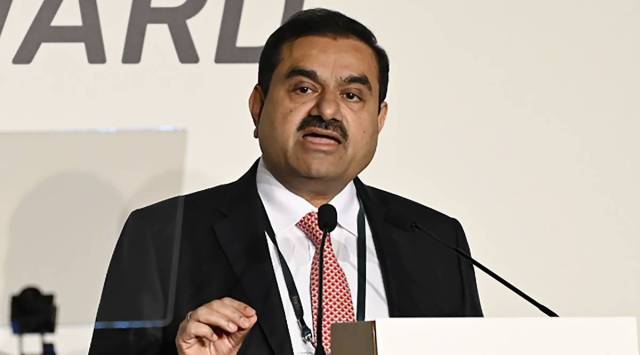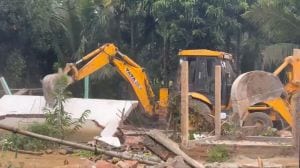With the Centre agreeing to its proposal to have a committee of experts to recommend measures to plug loopholes in the regulatory regime to prevent any loss to Indian investors due to market volatilities as was witnessed during the Adani-Hindenburg episode, the Supreme Court Monday agreed to its request to suggest what could be the remit of the proposed committee.
Meanwhile, in a note submitted to the top court, market regulator Securities and Exchange Board of India (SEBI) said it “is already enquiring into both, the allegations made in the Hindenburg report as well as the market activity immediately preceding and post the publication of the report, to identify violations of SEBI Regulations…” including those related to short selling.

Hearing two PILs filed in the wake of the Hindenburg report that alleged fraud and stock price manipulation by the Adani Group, the SC had, on the last date of hearing, said it was “thinking aloud” on whether a committee of experts could be put in place to suggest possible improvements to the regulatory mechanism.
Story continues below this ad
Responding to this Monday, Solicitor General Tushar Mehta appearing for the Centre told the bench of Chief Justice of India D Y Chandrachud and Justices P S Narasimha and J B Pardiwala that his “instructions are that existing structure — SEBI and are other agencies – are fully equipped, not only regime wise but otherwise also to take care of the situation…However, responding to the suggestion which fell from Your Lordships as a loud thinking, we would have no objection…the government has no objection constituting a committee”.
He added that “the remit of the committee would be very very relevant because any unintentional message to international or domestic investors that even a regulator or statutory authority requires monitoring by a committee appointed by the highest court of the country will have some adverse effect on the flow of money. So if your Lordships can permit us, we can suggest the remit of that committee with possible suggestions of names for the committee in a sealed cover. Because that may not be appropriate to discuss in open court proceedings we suggest some names, may or may not appeal to your Lordships, but would be people of calibre and some standing in their respective fields, other side objecting etc. So in all proprietary points of view we may file it for Your Lordship’s consumption…But the remit would be very very relevant…”
Agreeing to the request on the remit, the bench asked the SG to place the suggestions before it on February 17 when it will hear the matter next.
“You do this, you come back with a proposed remit of the committee on Friday…We will apply our mind to it and pronounce an order…”, CJI Chandrachud told the SG adding the court understands why the government was saying that the remit is important.
Story continues below this ad
“Becasue we would not like to undermine the competence of the agencies including the regulator and the regime available”, said the SG.
“You come out with what you think can be the remit. Then we can modify it, we can reflect on it…”, said the CJI.
The SC is seized of two PILs filed in the wake of the Adani-Hindenburg affair. One of the PILs has sought a declaration that short selling be declared as a fraudulent practice.
The SEBI, however, said in its note that “securities market regulators in most countries, and in particular, in all developed securities markets, recognize short selling as a legitimate investment activity….” and “instead of prohibiting short sales per se…have permitted it to take place within a regulated framework. The International Organisation of Securities Commissions (IOSCO) has also reviewed short selling and securities lending practices across markets and has recommended transparency of short selling, rather than prohibiting it. India follows this policy of regulated short selling and has framed its regime accordingly”.
Story continues below this ad
SEBI said that “Indian markets have seen far higher turbulent times in the past, especially during the Covid pandemic where Nifty fell by around 26% during the period of March 2, 2020, till March 19, 2020 (13 trading days). Even during such turbulent times, SEBI did not resort to banning short selling, even though there were demands for banning it; and the markets continued to function in a robust manner, recovering far faster that other global markets”.
It added that “overall market volatility in India is on par or lower than that in major developed markets.”
The note further said “SEBI has a robust set of frameworks and market systems to ensure seamless trading and settlement including frameworks for volatility management and restrictions on short selling including by foreign institutions.”
It said that “the events that are the subject of the PIL are related to one set of entities in the market and have not had any significant impact at the systemic level. While the shares of the Group have seen significant decline in prices on account of selling pressure, the wider Indian market has shown full resilience. The combined weight of the Group companies in Sensex is zero and in Nifty is below 1%”.
Story continues below this ad
The Board also urged the court to appreciate that “for the regulator to make any statement in respect of ongoing examination/investigation of cases, or on the basis of third-party reports, could seriously prejudice the entities under examination and thus it would not be appropriate” for it “to make any statements until the due process is complete”.
The market regulator said that it “has a strong framework for enforcement of market misconduct as well as other violations of its regulations” and that “the extant frameworks in place for investor protection and for ensuring stable operations and development of the market are robust and have been validated through the seamless operation and resilience of the markets at a systemic level, not just in recent weeks but even through the worst phases of the pandemic”.
The note added that “in case there are any learnings from the case that warrant policy review, SEBI would, as a specialised regulator, undertake the same in the normal course, following its established process of expert as well as public consultation”.









